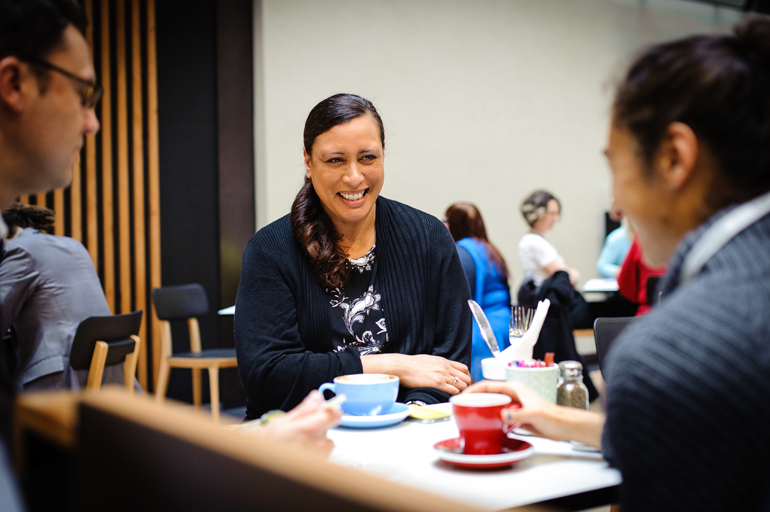Diversity, equity and inclusion
At MBIE, we value our people and strive to reflect the communities we serve. Our inclusion and diversity strategy, Nō Konei–Belong, focuses on having inclusion at the heart of our mahi, creating a sense of belonging and meeting public sector-wide diversity, inclusion and equity objectives.
On this page
An inclusive culture is essential, if we are to attract and retain diversity, and it makes sure multiple perspectives are included in policy advice and service design to help Grow Aotearoa New Zealand for All.
To understand the experiences of diverse population groups within MBIE, we have used human centred design principles through our People Experience hub. To date, we have engaged with our tangata whenua, Pasifika, Asian and Rainbow employees. We have also engaged with those who identify as being neurodivergent or having medical, physical or mental illnesses, disabilities, impairments, conditions or disorders, including caregivers and support people.
This has helped us identify actions we can take to work towards a more inclusive, accessible and equitable MBIE. Building on the learnings from our People Experience hub, initiatives undertaken have included a full review of our recruitment and career progression processes, to make sure our diverse communities have equitable outcomes.
Overall, as part of our commitment to equal employment opportunities, our programmes on diversity, equity and inclusion and Māori–Crown relations outline MBIE’s commitment to identifying and eliminating policies, procedures and other institutional barriers that cause or perpetuate inequality. In addition, we are committed to the Accessibility Charter and continue to make sure our public information is accessible. We assess our websites, to make sure they comply with the New Zealand Government Web Accessibility Standards, and to reasonably accommodate the needs of people with disabilities and supporting their health and wellbeing.

Inclusion and belonging programme
Papa Pounamu, led through Te Kawa Mataaho – Public Service Commission, sets the diversity and inclusion work programme for the wider public service. The 5 priority areas, which shape MBIE’s inclusion and belonging programme, focus on making the most positive impact across all diversity dimensions.
- Te āheinga ā-ahurea, Cultural competence: we are aiming to reflect the significance of the Māori–Crown relationship and increase our cultural competency and confidence across the broadest range of cultures.
- Te urupare I te mariu, Addressing bias: we are addressing bias towards identity markers, such as race, ethnicity, gender, sexual orientation and ability.
- Hautūtanga ngākau tuwhera, Inclusive leadership: we are building inclusion and diversity capability across the system, starting with strong and inclusive leadership.
- Te whakawhanaungatanga, Building relationships: we are building diverse and supportive relationships in our workplaces and drawing on these relationships to create positive change.
- Ngā tūhononga e kōkiritia ana e ngā kaimahi, Employee led networks: we are creating a space so people can connect with others with shared experiences to support people to bring their authentic selves to work.
For more information about the inclusion and belonging work programme, see Appendix 8, page 238, in the PDF format of this report.

Kia Toipoto: Closing gender, Māori, Pasifika, and ethnic pay gaps
MBIE’s gender pay gap has reduced and is trending downwards, now sitting at 12.91% (from 20.2% in 2016). This has been achieved through:
- Introduction of career and pay progression.
- Continuing to remove bias in career and pay related processes.
- Line-by-line pay reviews (like-for-like roles).
- Tools to support pay decisions, including recruitment guidelines, pay restraint guidelines and a remuneration comparator tool have been introduced, to help people leaders make more informed decisions around pay and the implications for pay equity.
For more information about what we are doing to close the gender pay gap, see Appendix 8, page 238, in the PDF format of this report.
Skills Pledge
MBIE signed up to the Government’s Skills Pledge, which guarantees a commitment to doubling investment in reskilling and training hours by 2025.
This investment includes introducing various face-to-face sessions and e-learning modules. During the year, 78,271 formal learning sessions were completed, comprising 17,655 face-to-face or virtual workshops and 60,616 e-learning modules completions. This equates to 129,192 formal learning hours.
Altogether, this is an increase of 78% in formal learning hours since MBIE’s commitment to the Skills Pledge, in 2020, and 22% more than last year.

